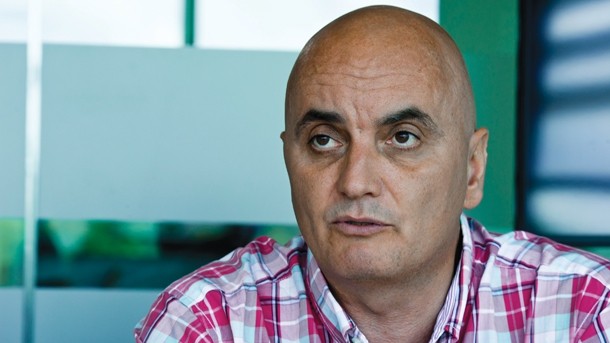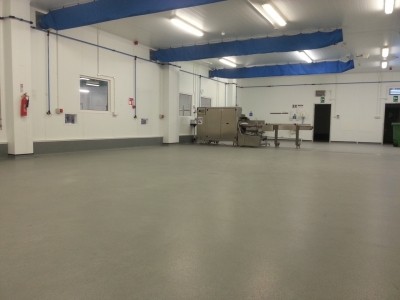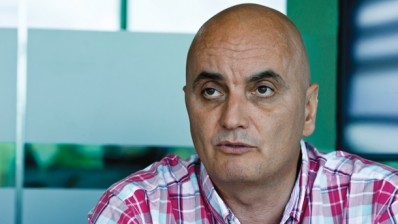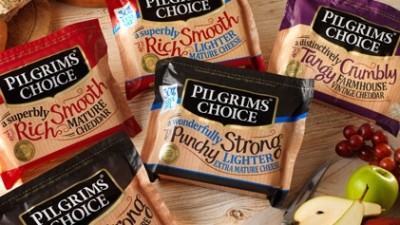Innovation is essential: cheese boss

We’re the largest cheese business in the UK and have managed to grow our turnover from £300M to £450M within a couple of years, despite the hard cheese market remaining flat.
At this site in Leek, we turn 20kg blocks of cheese into smaller blocks, slices or grated for our customers, most of which are the major retailers and foodservice firms.
This is a new building and cost £30M to build in 2009. It's built on the same site as our original factory, which was decades old.
Adams Foods has invested £60M in its UK operations since 2009, so we’re a really well-invested site. We invest to make ourselves more efficient. We just went through an end-to-end supply chain exercise with a major retailer, which will remain nameless, and there was nothing we could do better, which is encouraging. It’s a tick in the box to say we’re operating as leanly as is possible and can’t improve from a lean manufacturing perspective.
There are 25 processing and packing lines in the factory. Of those 14 deal with block cheese, three with sliced, five for grated, one for deli and one that processes mini portions.
Cheese production (Return to top)
Nearly 300t of cheese comes into the factory each day and annually we turn 60,000t of that into blocks and 30,000t into sliced and grated cheese products.
Around 14% of all cheese consumed in the UK comes from Adams. Also, 40% of all UK retail hard cheese and 50% of UK own-label hard cheese – the likes of the cheddars and the Red Leicesters – comes from Adams.
The majority (76% or £344M) of our £450M turnover comes from our own-label operations. Our cheese brands, such as Pilgrim’s Choice and Mu, take £80M (18%). We also market and sell Kerry Gold butter and although it is not processed here, it accounts for £21M (5%) of the business. We also do some contract packing for smaller producers, which is 1% (£5M) of the business.
Since I joined the company three years ago, we have about 300 fewer people working in the factory. Part of that has come from the consolidation of manufacturing sites, as well as lean manufacturing processes and automation.
We’re working hard to make the site leaner, but it will be a task to save more labour costs, as we will be adding automation only where it adds value and not for the sake of it. There are 700 staff here, some of them third generation, and we have a very low loss of 2%, which is unheard of for most factories.
Historically, we worked to two shift patterns five days a week. Now grated is on three shift patterns seven days a week and sliced and block are on three shift patterns five days a week.
Investment in innovation (Return to top)
Investment isn't solely focused on automation and efficiency, though. Under a year ago we spent £3M on our innovation centre, which has three processing and packing lines, to bring new products to our customers that are demanding more innovation.
For example, one of our major customers recently said: “Bring me innovation, but don’t bring it to me in block, sliced or grated,” so we worked very hard on that and the Pick n Mix range we recently launched is true innovation and is trying to add value to the category. The range comes in six variants in 80g trial packs and was launched into Tesco in April. They’re targeted at people who want to try something different, but in an affordable way. The offer is three for £3, so it’s not a massive risk for the customer in terms of purchase, but it allows them to try different flavour profiles, perhaps for after dinner or for a treat for oneself.
It’s designed to complement cheddar. We don’t want people to say: ‘I’m buying this instead of cheddar,’ but for it to be an incremental purchase. I think 40% of the sales so far have proved to be incremental, so it’s working.
Another new product from our Innovation Centre is Crumbles, which are very tiny cubes of cheese in bags. We’ve mixed them with bread crumbs or with herbs and cracked black pepper. Again, it’s just a different use of cheese you can coat chicken breasts with them or sprinkle them over a fish pie and we’re going to have to educate people on the fact that it’s cheese in a different format for a different occasion.
Innovation is key to growing the hard cheese category, but that's not to say it's going to disappear. It's a huge category within the market.
We may launch dozens of lines before we find the one that really hits the mark, but you have to be willing to make the odd mistake in order to do that and we're big enough and ugly enough to learn from those mistakes.
New techniques (Return to top)
In the development of the new products, we have created new techniques, but some are patented, so I can’t say what they are. However, I can say that we've invested millions of pounds, which will hopefully pay off. If they’re not successful, then we will push on to the next innovation. But the whole process of innovating is part and parcel of what the retailers are demanding. They want you to bring new things to the market, so we will keep doing that
At the moment, the supermarkets are embroiled in a price war and there’s huge change going on. This means huge change and risk for manufacturers and I can't identify a time when I have seen such pace of change.
To get through it in once piece, you have to have a balanced portfolio, but it also goes to show how difficult the UK industry can be. Anybody who says business in the UK is easy is either taking something or not watching what’s going on.
I believe we have a balanced portfolio. Tesco is our biggest customer and we have dealt with Aldi since it entered the UK in the 1990s. We also supply Iceland and Waitrose. But will being with the discounters from the start be good for us in the future? I couldn’t really comment on that. All I can say is that, while the market is turbulent, you need to try to balance your own business and we wouldn’t prioritise one customer over another, but our core customers will always remain our core.
What really worries me, is whether or not everyone else in the industry is working to the same technical standards. While some operate to high standards, others don’t, but that’s just life.
For us and our future, though, we will continue to invest in automation and possibly capacity, although not masses of it. There will be more investment in packaging formats, although I'm not 100% sure what they will be yet.
Listen to our exclusive podcast in which Adams Food’s marketing manager Alastair Jackson explained why cheese isn’t just cheese.
Factory facts (Return to top)
Location: Adams Foods, Sunnyhills Road, Leek, Staffordshire ST13 5SP
Staff: 700
Products: Hard cheeses in block, sliced, grated and crumb
CUSTOMERS: Tesco, Asda, Morrisons, Waitrose, Aldi, Sainsbury as well as some foodservice businesses
TURNOVER: £450M
Personal
NAME: Ian Toal AGE: 46
JOB TITLE: Chief executive, Adams Foods
Domestics: I'm married with two sons and two step daughters
OUTSIDE WORK: I like to play golf. I love music and love to play the guitar

















